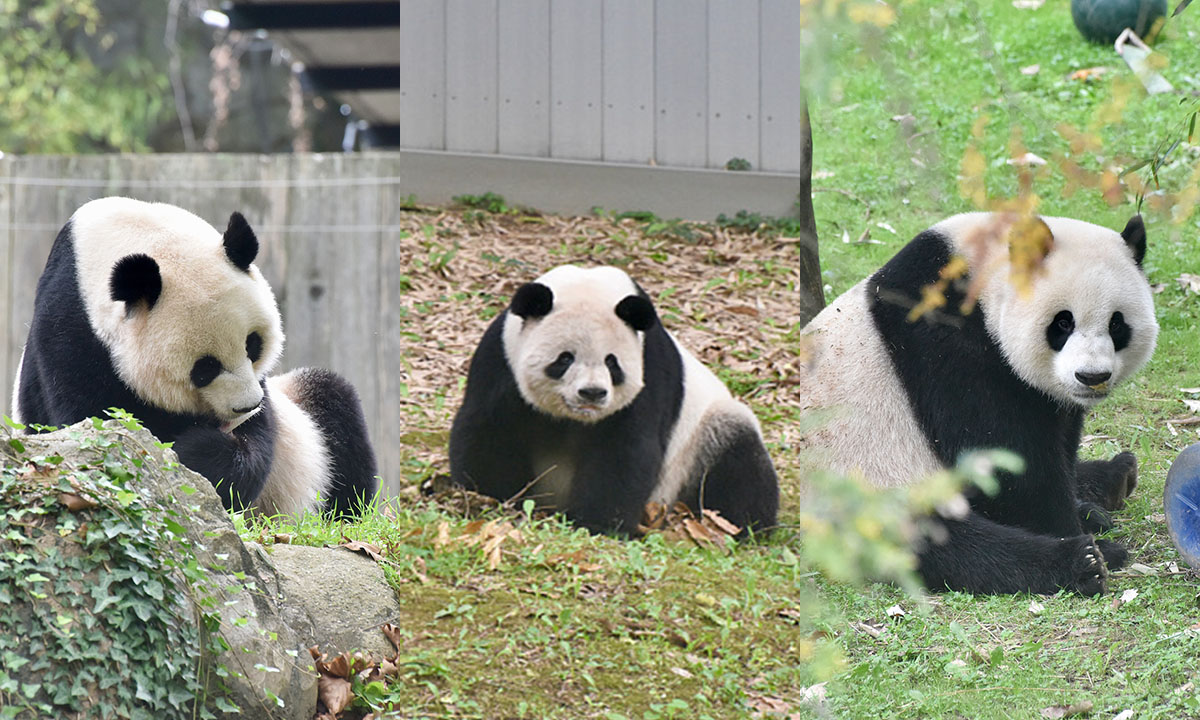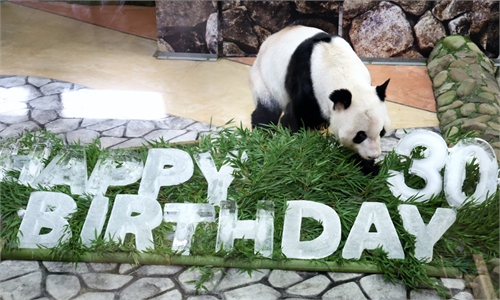Be wary of the politicization of 'giant pandas returning to the US': Global Times editorial

Mei Xiang, Tian Tian and their 3-year-old son Xiao Qi Ji. Photos: VCG
The topic of "giant pandas returning to the US" has become a hot issue in American public opinion in 2024. China's relevant statements have received high attention and enthusiastic interpretations. Several cities in the US, such as San Francisco, San Diego and Washington, have shown efforts and actions to attract giant pandas. The fondness of many Americans for giant pandas has even sparked some hidden psychological reactions among some American elites. Some American media outlets are politicizing this topic, which deserves our vigilance.
The love and enthusiasm of the US for Chinese giant pandas primarily stem from local initiatives and public sentiment. In the effort to have giant pandas reside in San Francisco, Mayor London Breed initiated communication with China several months before the APEC Leaders' Meeting last year, and later expressed willingness to host these "cherished diplomats" in a letter she sent to Chinese president. Michael Froman, president of Council on Foreign Relations, personally asked whether Washington can host a giant panda in a conversation with Liu Jianchao, head of the International Department of CPC Central Committee, during his visit to the US. The hopes for China-US relations lie with the people, and the foundation lies in the grassroots, as it's evident from the case of the giant pandas.
Many Americans eagerly anticipate the "return of giant pandas to the US," but not everyone shares this sentiment. In recent years, the unhealthy atmosphere against China in the US has led to many politicized interpretations of matters related to giant pandas. Those who do not wish for giant pandas to return to the US are not necessarily expressing a stance against the giant pandas themselves; rather, they view giant pandas as a politicized symbol and a representation of China's soft power. Their intention is to sever any ties that could bring the peoples of China and the US closer emotionally. Giant pandas, beloved by the peoples of both China and the US, and even people worldwide, easily become a target for them. Their aim is to destroy the positive aspects between China and the US.
In China, there are also some people who are unwilling to see the "giant pandas return to the US." However, unlike those Americans, these Chinese people's concerns stem from their compassion for giant pandas and worries about the poor care they receive in American zoos. This is understandable. Last year, when the emaciated appearance of the giant panda Ya Ya at the Memphis Zoo in the US was reported back to China, it sparked strong concerns and even accusations of abuse toward overseas cooperative institutions in terms of facility construction, feeding and care, disease prevention and control measures. The concerns are reasonable. Ultimately, Ya Ya was brought back to China.
Although various pieces of information also indicate that the Memphis Zoo had made many efforts to take care of the giant pandas and had no motive to abuse Ya Ya, the negative impact of this incident objectively exists. It needs to be emphasized that the opinions and concerns of Chinese netizens are not based on hostility toward American politics or society, but on the fact that Ya Ya was not well taken care of, which evokes a simple sentiment. If any American zoo wants to lease giant pandas, they need to learn from the Ya Ya incident and make the Chinese side believe that they can provide suitable living conditions and environment for the giant pandas.
There has been a saying that China took giant pandas as a diplomatic tool to open the door to China-US relations. This is incorrect. Instead, it should be said that giant pandas are a symbol of friendly or normal relations between China and the US. This is because only when both sides have established a baseline of trust, can there be a history of panda exchanges, where pandas travel across the ocean to the US, promoting cultural exchanges and fostering a heartwarming story between the people of China and the US.
The US is the country with the most cooperation in giant panda conservation research with China. Giant panda conservation is one of the most successful areas of animal cooperation between China and the US. Now, giant pandas have become "remarkable ambassadors," which is inseparable from the joint efforts of several generations of scientists from China and the US. This is the broader significance of China-US cooperation.
Today, the exchange of pandas continues the tradition of cultural exchange from the past, while also placing more emphasis on international cooperation in giant panda conservation and research. The adorable giant pandas are, to some extent, a message of peace and friendship that China conveys to the world. The more of such messages, the better.



